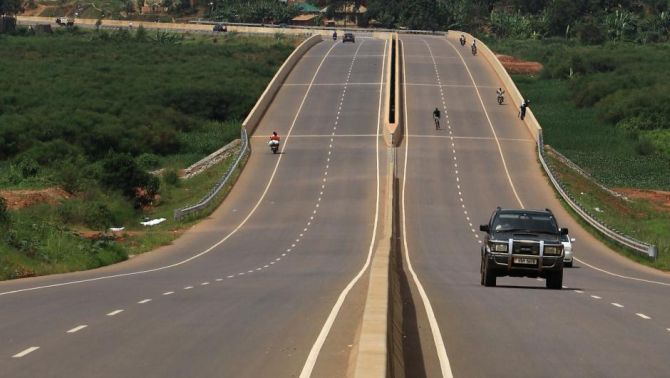If 2019-20 (FY20) was an unusual year for highway construction in India, with the pace of work slowing down for the first time since the Narendra Modi government assumed power in 2014, largely due to the general elections in May and liquidity crunch, the outbreak of the Covid-19 pandemic in 2020-21 (FY21) only made matters worse with lockdowns and labour unavailability.

The pace of highway construction in 2021-22 (FY22) has not been able to bulldoze the pandemic barriers in a year marred by two Covid-19 waves — the second at the start of the fiscal year, the third towards the close.
With localised lockdowns and restrictions on mobility, highway construction growth in the country has now fallen to a five-year low.
As of December 2021, the total highway construction during the current fiscal year stood at 5,407 kilometres (km). This is 59 per cent less than the achievement during FY21.
The per day construction has slowed to 20.17 km, from an average of 30 km during the last five years.
The growth rate is 20.6 per cent less than the April-November period of last year on a km constructed per day basis, reveals the data.
The slowdown comes at a time when the Ministry of Road Transport and Highways (MoRTH) and the state-owned National Highways Authority of India (NHAI) have seen record boost in their budgetary allocation in the Union Budget 2022-23 (FY23).
MoRTH has been allocated Rs 1.99 trillion, up 68 per cent over previous year. NHAI has seen 133 per cent increase in its allocation to Rs 1.34 trillion.
Finance Minister Nirmala Sitharaman, in her Budget speech, had announced that the PM Gati Shakti National Master Plan for expressways would be formulated in FY23.
“The touchstone of the NMP will be world-class modern infrastructure and logistics synergy among different modes of movement — both of people and goods — and location of projects,” she had said.
National highways in India have a total length of 140,995 km.
The government intends to expand the national highways network by 25,000 km in the next fiscal year — a 108 per cent increase from the revised target of 12,000 km for FY22.
Sector experts believe this is a tall order for the Centre as the sector faces backlog of projects and construction activity.
“While there were issues last year related to the pandemic, land acquisition, and financial closure, award activity has broadly been on the same levels for the past two-three years.
"The target of 25,000 km appears somewhat on the higher side,” said a Mumbai-based sector expert.
Over the past five years, national highway construction has seen an incremental trajectory. In FY21, 13,327 km of highways were constructed, against 10,237 km in FY20, and 10,855 km in 2018-19.
In 2017-18, 9,829 km of national highways were built, with a growth of 19 per cent from the last year.
As of December 2021, the Centre completed construction of 5,407 km on national highways, falling short of revised target of 12,000 km this fiscal year.
However, analysts pointed out that road construction historically picks up pace during the last three months of any fiscal year, given the April-November data is lower on account of monsoon.
“This year, we had Covid-19 restrictions in the beginning of the fiscal year and an extended monsoon, which could have impacted construction work.
"Hence, the April-December data showed a downward km per day growth trajectory.
"Yet, the government should be on track to achieve around 30 km per day highway construction for the full year,” said Vishal Kotecha, director, India Ratings & Research.
According to the data, on average, between March 2017 and December 2021, the government has built 49,655 km of national highways, with an average construction rate of 10,453 km a year.
Kotecha also said as the Centre has tried to address the legacy issues of the sector, it might accelerate construction.
The decision to not consider land acquired until payment for the acquisition has been made has augured well, as disputes used to arise between landowners and the government between the period of negotiation and payment, he added.











